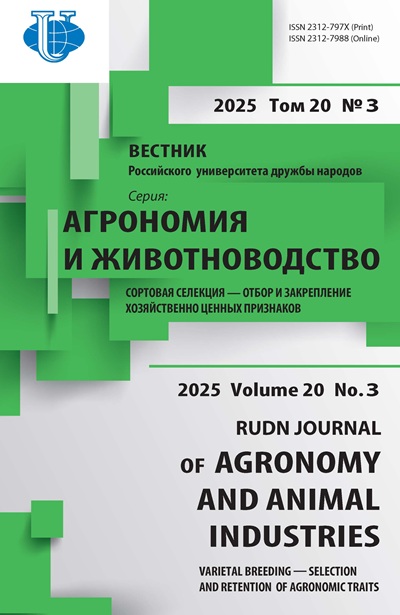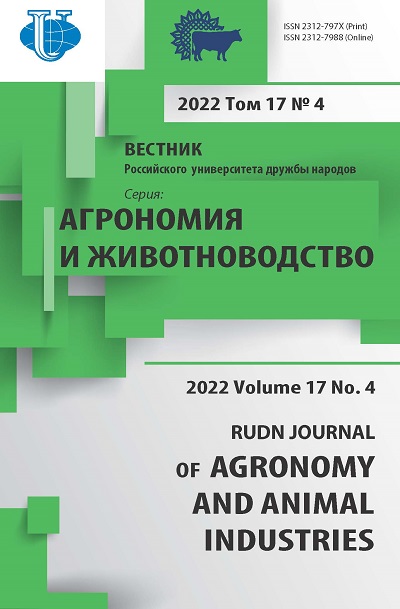Breeding value of safflower in arid conditions of the Northern Caspian
- Authors: Zaitseva N.A.1, Yachmeneva E.V.1, Klimova I.I.1
-
Affiliations:
- Precaspian Agrarian Federal Scientific Center of the Russian Academy of Sciences
- Issue: Vol 17, No 4 (2022)
- Pages: 466-472
- Section: Genetics and plant breeding
- URL: https://agrojournal.rudn.ru/agronomy/article/view/19829
- DOI: https://doi.org/10.22363/2312-797X-2022-17-4-466-472
- ID: 19829
Cite item
Full Text
Abstract
Low and unstable yields of the main oilseed crops do not create interest for their large-scale cultivation in conditions of the Northern Caspian - A strakhan region. For this reason, gross harvest of oilseeds is reducing significantly creating a vegetable oil shortage. Currently, safflower cultivation is relevant due to high drought resistance and quality indicators of safflower oil. 24 collection samples of safflower were studied on light chestnut soils of the Lower Volga region in 2019-2021. The experiments on safflower cultivars from seed collection of Vavilov Institute of Plant Industry were carried out at the experimental site of Precaspian Agrarian Federal Scientific Center of the Russian Academy of Sciences. Influence of the main abiotic and biotic environmental factors on morpho-biological and economic characteristics of safflower was determined. Based on the results obtained, the following promising samples having breeding value as a starting material for creation of new cultivars were identified: Gila, Shahalli-260, Tsambuli, Shirkas, Talan, Centr 70, Moldir, Nurlan, Aleksandrit, Shifo, Sinaloa-90. Productivity and oil content of the selected cultivars exceeded the indicators of cv. Astrakhan 747 (standard) by 0.43…1.06 t/ha and 1.75…3.02 %, respectively.
Keywords
Full Text
Characteristics of selected safflower cultivars, 2019—2021
Cultivar | Origin | Yield, t/ha | Oil content,% | Oil yield per 1 ha, kg |
Astrakhansky 747, st | Russia | 0.58 | 28.58 | 134.3 |
Gila | Mexico | 1.07 | 28.16 | 146.4 |
Sinaloa-90 | Mexico | 0.86 | 30.33 | 182.0 |
Aleksandrit | Russia | 0.61 | 31.02 | 145.8 |
VIR 2933 | Tajikistan | 0.87 | 28.54 | 119.9 |
Shahalli-260 | Tajikistan | 1.02 | 27.03 | 189.2 |
Tsambuli | Tajikistan | 1.64 | 29.37 | 264.3 |
Shirkas | Kazakhstan | 1.03 | 28.70 | 198.0 |
Talan | Kazakhstan | 1.01 | 30.47 | 158.4 |
Centr 70 | Kazakhstan | 1.28 | 27.86 | 242.4 |
Alkyzyl | Kazakhstan | 0.79 | 25.67 | 190.0 |
Moldir | Kazakhstan | 0.60 | 31.60 | 123.2 |
Nurlan | Kazakhstan | 0.72 | 31.02 | 186.1 |
Akmay | Kazakhstan | 0.80 | 29.14 | 195.2 |
About the authors
Nadezhda A. Zaitseva
Precaspian Agrarian Federal Scientific Center of the Russian Academy of Sciences
Email: konf_pniiaz@mail.ru
ORCID iD: 0000-0002-8227-398X
Candidate of Agricultural Sciences, Head of Laboratory of crop breeding
8 Severny quarter, Solenoe Zaimishche vil., Chernoyarsk district, Astrakhan region, Russian FederationEkaterina V. Yachmeneva
Precaspian Agrarian Federal Scientific Center of the Russian Academy of Sciences
Email: rfn.yz2009@mail.ru
ORCID iD: 0000-0003-4676-9408
Junior Researcher, Laboratory of crop breeding
8 Severny quarter, Solenoe Zaimishche vil., Chernoyarsk district, Astrakhan region, Russian FederationIrina I. Klimova
Precaspian Agrarian Federal Scientific Center of the Russian Academy of Sciences
Author for correspondence.
Email: irina.ssd1981@yandex.ru
ORCID iD: 0000-0001-9582-3752
Researcher, Laboratory of Agricultural Crops Breeding
8 Severny quarter, Solenoe Zaimishche vil., Chernoyarsk district, Astrakhan region, Russian FederationReferences
- Brazhnik VP. Problems and prospects of the center for breeding, seed production and technology of cultivation of oilseeds. Technical crops. 1995;(1—2):2—6. (In Russ.).
- Leontiev VI, Sukhareva EP, Ryabova EN. Cultivation of safflower in the dry-steppe zone of dark chestnut soils of the Lower Volga region. Scientific Agronomy Journal. 2013;(1):34—38. (In Russ.).
- Ruzheynikova NM, Kuleva NN, Zaitsev AN. Adaptivnaya tekhnologiya vozdelyvaniya saflora v usloviyakh Saratovskoi oblasti: rekomendatsii proizvodstvu [Adaptive technology of safflower cultivation in the Saratov region: Recommendations for production]. Saratov; 2012. (In Russ.).
- Andrinyuk AV, Ivanyushin EA. New oilseed culture in the Trans-Urals. Zaural’skii nauchnyi vestnik. 2013;(2):85—88. (In Russ.).
- Kilyanova TV, Safina NV. Production of safflower seeds in the Ulyanovsk region. Agromir Povolzh’ya. 2018;(1):29—32. (In Russ.).
- Ivanov VM, Tolmachev VV. Crop capacity and quality of dye safflower depending on sowing technology in Volgograd Zavolzhje. Proceedings of Lower Volga agro-university complex: science and higher education. 2010;(4):35—42. (In Russ.).
- Boldyr DA, Sukhareva EP. Technology of cultivation of safflower. Scientific Agronomy Journal. 2013;(2):23—26. (In Russ.).
- Shamsutdinov ZS, Kozlov NN. The importance of the genetic collection in the intensification of breeding forage crops. Selektsiya i semenovodstvo. 1996;(3—4):9—13. (In Russ.).
- Severov VI, Kalashnikov KG. Comparative tests of oilseeds in the Tula region. Technical crops. 1993;(3— 4):6—7. (In Russ.).
- Fernandez GCJ. Effective selection criteria for assessing stress tolerance. In: Proceeding of the International Symposium on Adaptation of Vegetables and Other Food Crops in Temperature and Water Stress Tolerance. Asian Vegetable Research and Development Centre: Taiwan; 1992. pp. 257—270.
- Rosielle AA, Hamblin J. Theoretical aspects of selection for yield in stress and non-stress environments. Crop Science. 1981;21(6):943—946.
- Gecgel U, Demirci M, Esendal E. Seed yield, oil content and fatty acids composition of safflower (Carthamus tinctorius L.) varieties sown in spring and winter. Int J Nat Eng Sci. 2007;1:11—15.
- Borodina NN. Economic efficiency of safflower cultivation. Fermer. Povolzh’e. 2019;(2):50—52. (In Russ.).
- Zaitseva NA, Yachmeneva EV, Klimova II, Dyakov AS. Perspective cultivars of safflower for cultivation under different humidity conditions on light chestnut soils in the Lower Volga region. Theoretical and applied problems of agro-industry. 2021;(3):23—27. (In Russ.). doi: 10.32935/2221-7312-2021-49-3-23-27
- Zaitseva NA, Klimova II, Yachmeneva EV, Dyakov AS. Study of safflower collection samples under arid conditions of the Astrakhan region. The Agrarian Scientific Journal. 2021;(10):26—29. (In Russ.). doi: 10.28983/asj.y2021i10pp26-29
- Zaitseva NA, Yachmeneva EV, Klimova II, Dyakov AS. Productivity of safflor «Cárthamus tinctórius» in various moisture security conditions. Proceedings of Lower Volga agro-university complex: science and higher education. 2021;(2):143—151. (In Russ.). doi: 10.32786/2071-9485-2021-02-15
Supplementary files















